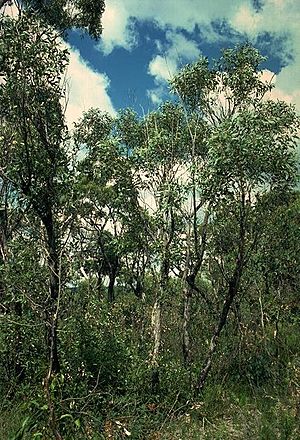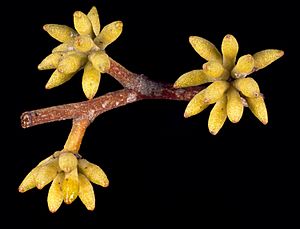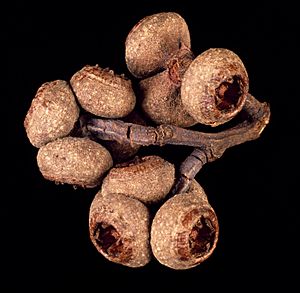Eucalyptus capitellata facts for kids
Quick facts for kids Brown stringybark |
|
|---|---|
 |
|
| Eucalyptus capitellata growing at Ku-ring-gai Chase National Park | |
| Scientific classification |
|
| Kingdom: | Plantae |
| Clade: | Tracheophytes |
| Clade: | Angiosperms |
| Clade: | Eudicots |
| Clade: | Rosids |
| Order: | Myrtales |
| Family: | Myrtaceae |
| Genus: | Eucalyptus |
| Species: |
E. capitellata
|
| Binomial name | |
| Eucalyptus capitellata Sm.
|
|
| Script error: The function "autoWithCaption" does not exist. | |
| Synonyms | |
|
Eucalyptus capitellata Sm. var. capitellata |
|
Script error: No such module "Check for conflicting parameters".
The Brown Stringybark (Eucalyptus capitellata) is a special type of tree. It is also known as brown stringybark. This tree only grows naturally in New South Wales, Australia. It is a small to medium-sized tree.
It has rough, stringy bark that covers its trunk and even its smallest branches. The leaves of adult trees are shaped like a spear or are slightly curved. Its flower buds are shaped like spindles or are oblong. They grow in groups of seven or more. When the tree flowers, it has white blossoms. The fruit grows in clusters and is shaped like a flattened half-sphere.
Contents
What the Brown Stringybark Looks Like
The Brown Stringybark tree usually grows to be about 20 to 25 meters (65 to 82 feet) tall. It has a special woody swelling at its base called a lignotuber. This helps the tree regrow after a fire.
Bark and Leaves
The bark is rough and stringy. It is grey to brownish in color and covers the whole tree, from the main trunk to the smallest branches.
Young plants and new shoots have leaves that grow in pairs. These leaves are egg-shaped or broadly spear-shaped. They are usually 55 to 80 millimeters (2.2 to 3.1 inches) long and 25 to 40 millimeters (1.0 to 1.6 inches) wide.
Adult leaves grow one after another along the stem. They are shiny green on both sides. These leaves are spear-shaped or slightly curved. They are 80 to 130 millimeters (3.1 to 5.1 inches) long and 20 to 35 millimeters (0.8 to 1.4 inches) wide. Each leaf has a stalk, called a petiole, that is 8 to 20 millimeters (0.3 to 0.8 inches) long.
Flowers and Fruit
The flower buds grow in groups of seven, nine, eleven, or more. They are found on a single stalk called a peduncle, which is 15 to 20 millimeters (0.6 to 0.8 inches) long. The individual buds usually do not have their own stalks.
When the buds are ready, they are shaped like a spindle or an oval. They are 6 to 8 millimeters (0.2 to 0.3 inches) long and 3 to 4 millimeters (0.1 to 0.2 inches) wide. Each bud has a cone-shaped cap called an operculum.
The Brown Stringybark mainly flowers between December and February. Its flowers are white. After flowering, the tree produces woody fruit. These fruit are flattened and shaped like a half-sphere. They are 4 to 7 millimeters (0.2 to 0.3 inches) long and 7 to 10 millimeters (0.3 to 0.4 inches) wide. The fruit grow in clusters, and their opening parts are usually level with the edge of the fruit.
How the Brown Stringybark Got its Name
The Brown Stringybark was first officially described in 1795. This was done by a scientist named James Edward Smith. He wrote about it in his book, A Specimen of the Botany of New Holland.
Smith noted that a drawing of this tree's fruit had been published before. It was in a book by John White, a surgeon and naturalist from the First Fleet. However, the drawing was wrongly labeled as Eucalyptus piperita.
The second part of the tree's scientific name, capitellata, comes from a Latin word. It means "with a little head." This name might refer to how the fruit grows in small clusters.
Where the Brown Stringybark Lives
The Brown Stringybark grows in open forests or woodlands. It usually prefers poor, sandy soil. You can find it in coastal areas of New South Wales. These areas are located between Karuah and Nerriga.
See also
In Spanish: Corteza fibrosa parda para niños
 | Charles R. Drew |
 | Benjamin Banneker |
 | Jane C. Wright |
 | Roger Arliner Young |



